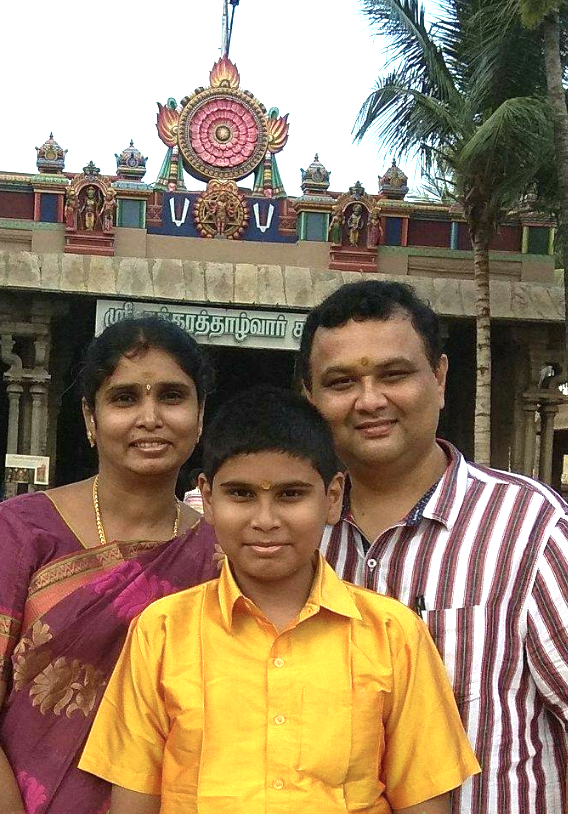In Conversation With
Mr. ChennaKrishna
Business Head (ID Homes Division)
“We should just be manufacturers and not choose what to manufacture, but be able to manufacture anything and do it well.” These words of Mr. Chennakrishna have a story behind them. In 2012, we expanded into the home division. This would not have been possible if we had limited ourselves to being only garment manufacturers.
A decade ago, in the first week of January 2012, Mr. Chennakrishna was one of the first people to be brought on board as ID diversified into the home sector. He came on as a merchandising manager. His role consisted of handling and converting potential buyers and overseeing the product cycle from development to shipment. Now for the past two years, he has been the business head for the ID Homes division.
Q: What was the initial stage when starting the ID Homes products? How was the whole process implemented?
CK: I was a bit nervous when taking up home products as they are much bigger in size and much heavier. A sofa cover can weigh up to 4-5kgs because the fabric we use can go up to 500 gsm. But Mr Ravi (Director – Homes) really put my mind at ease by stating simply that a ‘Stitch is a stitch’. We should be able to manufacture anything. That’s the beauty of the whole thing.
The line production of home textiles is tremendously different. In a way, its simplicity works in a counterproductive way. There was a process of adaptation when collaborating with the production team. Tailors who are used to working with 18 to 20 panels for a single garment found the notion of sewing the four corners of two square panels for a tablecloth a bit peculiar. It took one and a half years to allocate production capacity specifically for homes we started with 30 machines in NJK phase 3 and eventually moved to 50. Today, we have two fully functioning factory units for home furnishing production.
Q: What was your background before Indian Designs? Can you tell us about your career history?
CK: I started my career in 1999. I worked in garment manufacturing for eight years in a company in Chennai. Then I moved to home textiles, and even though I joined as an SAP implementer, I eventually found myself in the costing department. When you are responsible for costing, the entire manufacturing process comes into the picture. You not only have to take into account the cost of the material but also the time taken to produce the garment. How is it stitched? What is the SAM (Standard Allowed Minutes) of the garment?
I would also often visit the factories to get in tune with the physical workings. Ultimately, you have to prove the costing you have made. For example, we check if the manpower being increased in a particular section is really needed, and if it is, it should not exceed the budget we have. If there is a lag, we have to be there to support it. So this experience helped me shift from SAP officer to the manufacturing part of it. Slowly I gathered knowledge about the industry, and when I made the switch to ID, I knew I was ready.
Q: How was the journey from merchandising manager to business head?
CK: It happened in a phased manner, not immediately. First, I needed to prove my performance for the management to believe in me. That took me two years. To put it simply, whatever task was given to me by the management or CEO, I fulfilled it, and so I got more opportunities to perform. Then, I had to create a basic business principle and get it approved by the CEO. All these results added up, and the company gave me this position. Homes is a section now that holds 30-35% of ID’s turnover/contribution. That’s really something considering we started from scratch in 2012.

”Mr Ravi (Director - Homes) really put my mind at ease by stating simply that a ‘Stitch is a stitch’. We should be able to manufacture anything. That's the beauty of the whole thing.
ChennaKrishnaBusiness Head - Homes Division
Q: Would you consider Homes one of ID’s strength?
CK: The true strength of Indian designs lies in efficiency. If we have a large order for which we are manufacturing a product continuously, we are able to achieve incredible efficiency for it. We have skilled industrial engineers, and we plan in a fantastic manner. It will take us some time but we intend to continue and increase the optimum utilisation of capacity. This creates a sustainable ecosystem for a sizeable factory that provides thousands of jobs in tier-two areas.
Q: You are known as someone who is able to uniquely approach people for tasks in a way that they will understand. Would you say that’s true?
CK: Absolutely! We should always be open to everything. We should respect everyone, nobody is obliged to do something just because I have said it. It is a two-way communication. If someone is listening to whatever I say, I have to listen to what they have to say. That is how you can get the work done, it can’t be done otherwise. This is also something I have picked up from my superiors in previous years. For example, Mr. Javeed (Executive Director) always has his cabin door open. They have always been open to discussing anything. So I have naturally followed them and kept the open-door policy. That is the close culture here at ID. I strongly believe it’s a team effort and not an individual. In garment manufacturing, there are so many people involved in every process you cannot monitor everyone. You have to be approachable, so people come to you when there is a problem, and you can find the solution together.
The approach of giving people the space, time and support they need holds true in Mr. Chennakrishna’s personal life and parenting philosophy as well.
The experience of being a father, he says has given him good self-control. Originally from Salem, Mr. Chennakrishna moved to Chennai to start his career. Even though this was a huge move, it was necessary because, in his own words – “You have to be where the industry is.”

His son, Niranjan, was born while Mr. Chenna was still pursuing the early parts of his career in Chennai.
“There were two hospitals near my place, and every 15 days, we would visit one of them with my son having one illness or another. Till the child is two years old, you have to take a lot of care. Of course, Kala (my wife) and I took turns doing the night duty. Each of us got only 3 hours of sleep. So that experience has taught me extreme self-control. Even now, I tell people that whatever the situation is, just stay calm.”
“So that experience has taught me extreme self-control. Even now, I tell people that whatever the situation is, just stay calm.”
At first, I thought my son wanted to come into the textile industry because I had a textile background, but he categorically says he doesn’t want to do it. And I’m okay with it, so I said, whatever you want to do, we’ll support you, just get a good college according to your stream, that’s it. That’s all I want. He is interested in computer science and is pursuing it.
Q: How do you spend your free time as a family?
CK: Mornings we have our routines set for breakfast and getting ready for school/office, and I drop off my son at his college on my way to work. Evening hours we spend together as a family, doing nothing specific, just chatting, talking about our day and everything and nothing. My wife follows some soap operas, so she might watch them in the evenings but only Mondays to Fridays, weekends her time is reserved for me.
Q: You are good friends with your co-workers Mr. Muthuraman, Mr.Viswanath and Mr. Vinay. How have you managed to maintain your friendship over the years?
CK: So at work, we all have lunch together at around 3pm. We also have a lot on our minds, and we talk about it. If someone is facing a hurdle, we brainstorm together. And the most important thing is we don’t have egos; everyone has problems. If he is facing a problem today, I could face the same problem tomorrow. So if I’m facing a problem, I share it with them openly. I don’t feel guilty or embarrassed. Why not throw the issue in front of everyone and get their opinion? From that, I can take what suits and works for me the best. It’s a big tree with many branches one person can’t do it.
Vishwanath and I have been friends since college. We actually live in the same apartment complex. But the thing is, we separate the work culture and the home culture; we have to. Once we enter our homes and close the doors, we should forget work and not disturb each other for it.
Q: You are known to be such a jovial person. Always positive! What’s your secret?
CK: I have always had a positive mind since childhood. My mind was negatively occupied once when my father was in the hospital. But once I crossed that difficult part of life, I understood that what time we have in life, we should spend it positively. Whatever happens, let it happen. But the feeling should come naturally to you from within you cannot create it from the outside.
Q: We are curious – Who do you look up to?
CK: Religiously, I can say I have followed Raghavendra. I believe that there is some cosmic energy which inspires us but if you want some specific personality, then it would be the late Vethathiri Maharishi from Coimbatore. He taught pranayama (yoga of breathing) and had a few teachings. I hold them dear and follow them.

Q: Any hobbies?
CK: I have an aspiration for reading. I used to read when I was younger but lost track of it in between and have just picked it up. There is a book called “Ponniyin Selvan” by Kalki. It’s a big volume, and I had stopped reading it mid-way, but I have picked it up again. I had dreams trying to figure out why I stopped reading it. It’s a Tamil book about the Chola empire from Tamil Nadu. It’s written and explained beautifully. So every day I read for half an hour. Also, as part of my routine, I take a 30 min walk in the morning, and I really enjoy doing that too.
Q: And finally, where do you see the future of ID Homes?
CK: The future is open and holds infinite possibilities. It may be a chair, it may be a sofa, or it may be a storage box. It could be anything but we will not restrict ourselves. Even if it’s a bit of a departure from standard textiles, we should train for it, and adopt people who have expertise in it. I believe the future of ID homes is a unique basket of offerings and definitely exciting.
